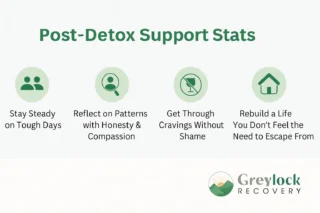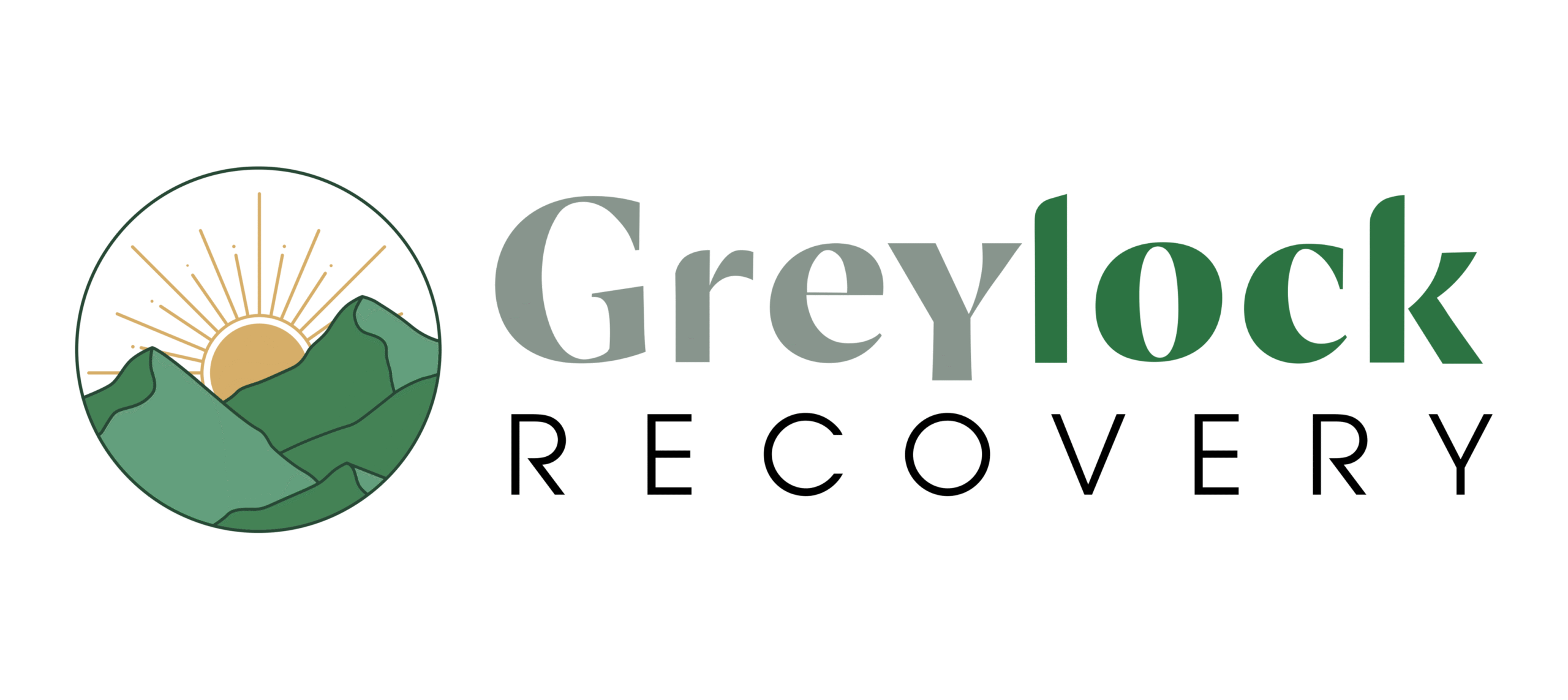Detox is a powerful first step—but it’s not the whole staircase. If you’ve recently completed detox, or you’re thinking about it, you might be wondering: What happens next?
It’s a common moment of pause. The crisis has settled a bit. Your system is clearing out. You’re thinking more clearly, but everything still feels uncertain. That’s not a sign you’re failing. It’s a sign you’re human—and that you’re in the vulnerable but promising in-between where true support really starts to matter.
At Greylock Recovery, we know that what comes after detox is often just as important as the detox itself. A strong support system can make the difference between staying stuck and moving forward—even if that forward motion is slow, non-linear, or still full of questions.
Let’s walk through some of the most common questions we hear from people who’ve finished detox (or are just considering it) and are now looking for stability, connection, and clarity.
What kind of support do I actually need after detox?
Detox addresses the physical side of things—it helps your body safely separate from substances. But it doesn’t automatically solve what led you there, what you’re carrying underneath, or how to navigate the emotional shifts that come once you’re sober for more than a few days.
That’s where support systems come in.
You need people and places that can help you:
- Stay steady on tough days
- Reflect on your patterns with honesty and compassion
- Get through cravings without shame
- Rebuild a life you don’t feel the need to escape from
That support can look like:
- Clinical care like outpatient treatment or therapy
- Peer support—people who get it, even if you don’t know them well yet
- Family or chosen family who respect your process
- Practical routines that give your days structure and predictability
It doesn’t need to be perfect. It needs to be real.
Do I have to join a 12-step group to stay sober?
Nope. While many people find value in 12-step programs like AA or NA, they’re not the only option. What matters most is that you find something—a space, a circle, a community—that helps you feel less alone and more connected to your goals.
Some people thrive in 12-step communities. Others feel more supported by:
- SMART Recovery (a science-based, self-empowered recovery model)
- Refuge Recovery (a Buddhist-inspired path to healing)
- Recovery Dharma (mindfulness-based peer-led support)
- Sober-curious communities that focus on intention, wellness, and non-abstinence-based change
- Sober fitness groups, book clubs, or online spaces with shared values
Think of it like choosing a gym. The best one is the one you’ll actually go to. The same is true here: the best support is the one you’ll actually use.
What if I’m not sure I want to be completely sober?
This is more common than people admit. Detox may have been necessary for safety or clarity, but that doesn’t always mean you’re ready to claim lifelong abstinence or the identity of “being in recovery.”
And that’s okay.
Being sober curious means you’re exploring a different way of being—one that doesn’t revolve around substances as your main coping tool. You’re allowed to take that exploration seriously without committing to forever.
Building a support system post-detox doesn’t mean locking yourself into a rigid identity. It means giving yourself a better chance to make decisions you won’t regret tomorrow. And if you want help sorting through what that means for you, Greylock is here for exactly that.

What do I say to friends or family who don’t understand?
This is one of the hardest parts for many people after detox. Your body might feel better. Your mind might feel clearer. But your people? They’re still in the patterns you just left.
Here’s the truth: You don’t owe anyone a perfect explanation.
If someone asks why you’re not drinking or using, or why you’re going to therapy or groups, you can keep it short:
- “I’m just focusing on my health right now.”
- “I’ve realized some things weren’t working for me, so I’m trying something new.”
- “I’m taking a break for a while.”
Not everyone will get it. And some might push back, joke, or downplay it. That says more about them than you.
One phrase we offer to clients:
“I don’t need you to understand—I just need you to respect it.”
You’re allowed to set boundaries without burning bridges.
What if I feel lonely after detox?
You might. In fact, it’s likely. And that doesn’t mean you’re doing it wrong.
Detox often removes more than just substances. It disrupts social circles, weekend plans, daily routines. It can feel like someone hit “mute” on your life—and now you’re sitting in the silence, wondering what’s left.
That’s where intentional connection comes in.
Try this:
- Go to a support group—not to fix anything, but to hear human voices in real time.
- Text someone safe and say, “I don’t know what to say, but I needed to say something.”
- Try a sober event or meetup, even if you leave early.
- Take yourself on a “reconnection walk”—no phone, no pressure, just you and the world.
Loneliness isn’t proof that you’re broken. It’s proof that you’re aware. And awareness, while hard, is always the start of something real.
What does a “support system” actually look like day-to-day?
It’s not always deep talks and group hugs. Often, it’s quieter and more practical:
- A weekly therapy session where you can unload
- A friend you can call without explaining everything
- A consistent bedtime that helps you feel less fried
- A group text that doesn’t revolve around drinking
- One space—online or in person—where you’re seen without performance
Support isn’t about perfection. It’s about access. Who can you reach when things feel shaky? What practices help you stay rooted? What places feel honest?
Build from those.
What does Greylock Recovery offer after detox?
Detox is just the first piece of a longer process. At Greylock Recovery in Williamstown, we don’t just walk you through the physical part—we walk beside you through the emotional and relational parts, too.
Here’s how we support clients after detox:
- Personalized next-step planning tailored to your goals and comfort level
- Outpatient programs that let you explore deeper work at your own pace
- Therapeutic support including one-on-one, group, and family therapy
- Sober lifestyle resources—local, online, or a blend of both
- Real humans who don’t just discharge you—they check in, follow up, and stay present
We know that the questions don’t stop once the substances leave your system. That’s why we don’t stop either.
How do I start building this system if I don’t know anyone?
Start small. One connection can change your whole week. One safe conversation can shift your entire sense of self-worth.
- Call a treatment center like Greylock and ask, “What do people usually do after detox?”
- Try one group meeting—even online. Just listen.
- Ask your therapist or care provider for names of peer supports or alumni networks.
- Go where the quiet people are—yoga, hiking, creative spaces. There’s less pressure, and more room to be yourself.
You don’t need a full network today. You need one thread to pull. Just one.
Ready to Take the Next Step?
Call (413) 848-6013 or visit Greylock Recovery’s Detox Program to learn more about how we support your healing—before, during, and after detox in Williamstown, Massachusetts. You’re not expected to do this alone. And now, you don’t have to.


